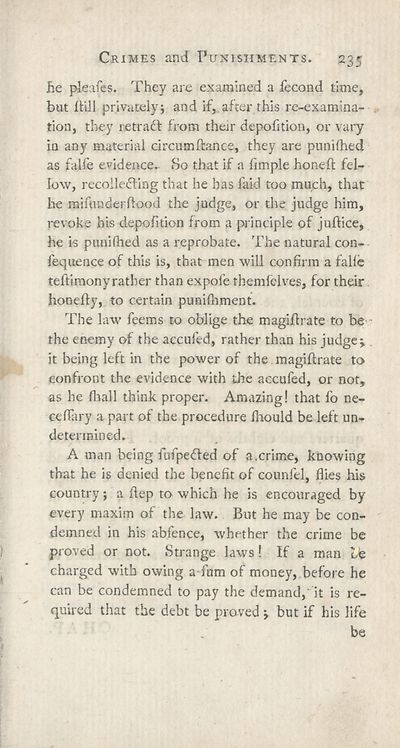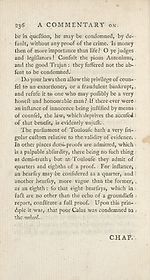Download files
Complete book:
Individual page:
Thumbnail gallery: Grid view | List view

Crimes and Punishments. 235
he pleafes. They are examined a fecond time,
but itill privatelyj and if,.after this re-examina¬
tion, they netradf from their depofition, or vary
in any material circumftance, they are punifhed
as falfe evidence.. So that if a Ample honeft fel¬
low, recollefling that he has laid too much, that
he mifnnderftood the judge, or the judge him,
revoke his depofition from a principle pf juftice,
he is punifhed as a reprobate. The natural con-
fequence of this is, that men will confirm a fallc
teftimony rather than expofe themfelves, for their
honefty, to certain puaifhment.
The law feems to oblige the magiftrate to be
the enemy of the accufed, rather than his judges
it being left in the power of the magiftrate to
confront the evidence with the accufed, or not,
as he (hall think proper. Amazing! that fo ne-
cefiary a part of the procedure Ihould be left un¬
determined.
A man being fufpe&ed of a.crime, knowing
that he is denied the benefit of counlel, flies his
country; a ftep to which he is encouraged by
every maxim of the law. But he may be con¬
demned in his abfence, whether the crime be
proved or not. Strange laws! If a man bfe
charged with owing a fum of money, before he
can be condemned to pay the demand, it is re¬
quired that the debt be proved i but if his life
be
he pleafes. They are examined a fecond time,
but itill privatelyj and if,.after this re-examina¬
tion, they netradf from their depofition, or vary
in any material circumftance, they are punifhed
as falfe evidence.. So that if a Ample honeft fel¬
low, recollefling that he has laid too much, that
he mifnnderftood the judge, or the judge him,
revoke his depofition from a principle pf juftice,
he is punifhed as a reprobate. The natural con-
fequence of this is, that men will confirm a fallc
teftimony rather than expofe themfelves, for their
honefty, to certain puaifhment.
The law feems to oblige the magiftrate to be
the enemy of the accufed, rather than his judges
it being left in the power of the magiftrate to
confront the evidence with the accufed, or not,
as he (hall think proper. Amazing! that fo ne-
cefiary a part of the procedure Ihould be left un¬
determined.
A man being fufpe&ed of a.crime, knowing
that he is denied the benefit of counlel, flies his
country; a ftep to which he is encouraged by
every maxim of the law. But he may be con¬
demned in his abfence, whether the crime be
proved or not. Strange laws! If a man bfe
charged with owing a fum of money, before he
can be condemned to pay the demand, it is re¬
quired that the debt be proved i but if his life
be
Set display mode to:
![]() Universal Viewer |
Universal Viewer | ![]() Mirador |
Large image | Transcription
Mirador |
Large image | Transcription
| Antiquarian books of Scotland > Crime & punishment > Essay on crimes and punishments > (237) |
|---|
| Permanent URL | https://digital.nls.uk/129850871 |
|---|
| Description | Thousands of printed books from the Antiquarian Books of Scotland collection which dates from 1641 to the 1980s. The collection consists of 14,800 books which were published in Scotland or have a Scottish connection, e.g. through the author, printer or owner. Subjects covered include sport, education, diseases, adventure, occupations, Jacobites, politics and religion. Among the 29 languages represented are English, Gaelic, Italian, French, Russian and Swedish. |
|---|

